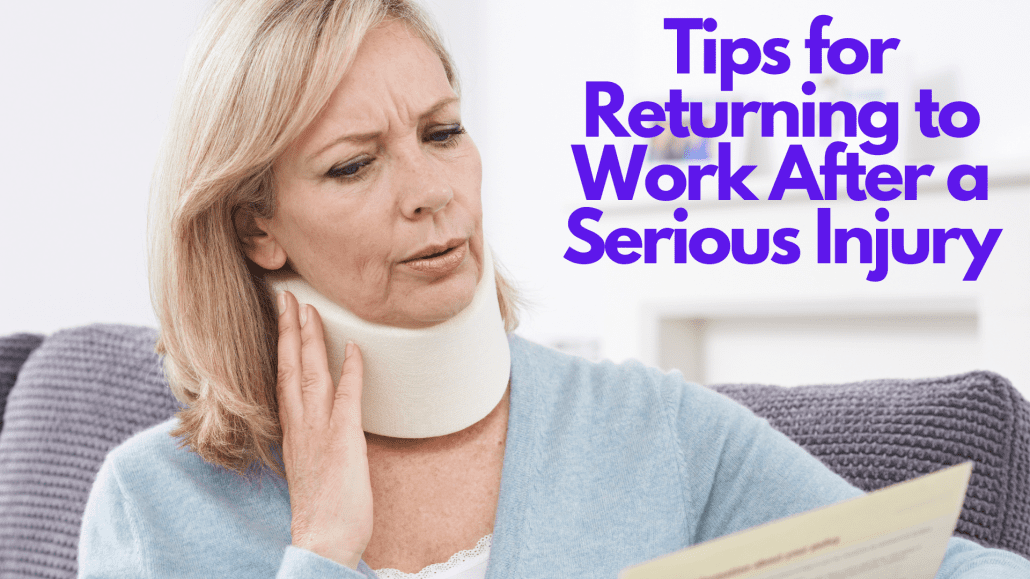Returning to work after a serious injury can be challenging. Adrenaline rushes through the body after being involved in a car accident, making it seem as if someone is fine, even though they are seriously injured. You should wait three days at least to let the adrenaline completely disappear from your body and check for any injuries.
You are likely to have many racing thoughts if you’ve recently been injured in a car accident. You’re probably feeling overwhelmed. The time away from work, the medical bills in the future, and whether you’ll ever be able to live as you did before the accident may concern you. Furthermore, you are unlikely to know how severe your injuries are until weeks after your accident.
The additional time you need to take off work may depend on the severity of your injuries, the treatment plan, and your doctor’s recommendations. You will be more likely to re-injure yourself or prolong your recovery if you return to work before you are fully healed. Here are some tips for preparing for your return to work after a serious injury:
Follow Up with Doctor’s Appointments
Document Evidence of Your Symptoms and Complications
Keep in Touch with Your Employer
Respect any Limitations from Your Injury
Do Not Go Back to Work Before You are Ready
Know What to Do If You Re-Injure Yourself or Learn You Can’t Go back to Work
Consider Vocational Rehabilitation

Follow up with Doctor’s Appointments
After a serious injury, your healthcare provider will create a treatment plan and schedule follow-up appointments. Attend these appointments and follow instructions carefully. Promptly document and report any new symptoms to adjust your recovery plan and inform your insurance company.
Ad adhere to your doctor’s recommendations when returning to work after a serious injury. Neglecting medical advice may worsen your condition, extend recovery time, or complicate your return to work. It could also affect your ability to receive compensation. Your return-to-work date will be determined based on your recovery plan and follow-up appointments.
Your recovery plan may be impacted if you end up neglecting your medical responsibilities and ending your recovery plan early. It is possible for your condition to worsen or to develop new ones. As a result, you may have to extend your recovery time before returning to work. In addition, if you do not follow your doctor’s advice, you may have difficulty getting compensation for your injuries.
Document Evidence of Your Symptoms and Complications
After an accident, seek immediate medical attention and document all physical and mental symptoms. This information is crucial for your personal injury case and helps your doctor create an optimal recovery plan.
As you recover, maintain a journal of your feelings and progress. This helps your doctor assess your healing process and determine when it’s safe for you to return to work after a serious injury. Regular documentation allows for adjustments to your recovery plan and helps identify potential complications, ensuring a smoother transition back to the workplace.
Keep in Touch with Your Employer
A worker with an injury must provide their employer with out-of-work or restriction slips during the treatment period, with regular updates that do not contain excessive details. Employers may often help create a reintegration plan for an employee returning to work after a serious injury. These plans often take into account the employee’s old responsibilities as well as their current abilities.
An injured worker must discuss his or her limitations with the employer before being allowed to return to work on light duty so that all parties know the return-to-work expectations. When an employer cannot accommodate an injured employee’s limitations, the injured worker is entitled to remain out of work and continue to receive benefits until either the employer can accommodate the limitations or the injured worker can return to full duty.
Respect any Limitations from Your Injury
When providing a disability certificate, doctors usually explain any limitations an employee may have. Some of these limitations may be:
- Reducing hours an injured worker works during a shift
- Limiting the amount and weight a person is expected to lift
- Regular breaks during a shift.
- Excluding the use of heavy machinery
- Excluding certain work activities, such as bending, stooping, or crawling
It is critical to inform your employer of your limitations before returning to work and keep a copy of it.
When returning to work, employees should also pay attention to their bodies. When workers return to work, they usually pour all their energy into it. However, injured workers are responsible for informing their doctors of the nature of their employment so that a restriction slip can be issued according to their current medical condition. Those who have suffered work-related injuries do not want to relive the experience again. To avoid causing new injuries, employees must respect their boundaries.
Do Not Go Back to Work Before You are Ready
You should not return if your doctor hasn’t cleared you to do so. Your recovery may be affected if you return to work too soon, and you may re-injure yourself. Regardless of whether you feel well enough to return to work, it would be best to listen to your doctor. Make sure you can perform work tasks to your fullest capacity. Often, overextended employees ask for trouble when they return to work before they are ready. Your doctor may recommend that you return to work with medical restrictions to recover fully. Re-injuring yourself after returning to work on your own and against your doctor’s advice can only lead to frustrations for both of you and your employer.
A Florida workers’ compensation lawyer can help if you are concerned about finances after your workers’ compensation benefits have been remitted or revoked. If you cannot work, your attorney may be able to seek benefits on your behalf.
Know What to Do If You Re-Injure Yourself or Learn You Can’t Go back to Work
Despite following your recovery plan and returning to work when you’re ready, there is always a chance you can re-injure yourself or your previous condition can resurface. Your employer will want to know about this, and you should make an appointment with a doctor as soon as possible.
Upon returning to work after a serious injury, you may discover that you can no longer perform the duties of your previous role. You can discuss this with your employer. It may be possible to work in another position until your body heals more. It might also be a good idea to visit your doctor again. They’ll evaluate your injuries to find out why you cannot return to work yet. They may tell you to take more time off.
Consider Vocational Rehabilitation
An injured worker should determine if permanent work restrictions are appropriate after treatment or when medical care is almost done. If permanent restrictions exist and the employer can’t accommodate them, the worker might be eligible for vocational rehabilitation. In vocational rehabilitation, a counselor helps the worker find new employment while receiving the same weekly benefits. The goal is to obtain suitable gainful employment. Injured employees need to have legal representation to protect their benefits.
In vocational rehabilitation, a professional counselor assists the injured worker in obtaining new employment. During vocational rehabilitation, the injured worker is entitled to the same weekly benefits they received when receiving medical benefits and unable to work.
Vocational rehabilitation aims to assist the injured worker in obtaining “suitable gainful employment.” Vocational rehabilitation is completed once the worker obtains such employment, whether with their old or new employer.
The process of recovering and returning to work after a serious injury can be complicated and confusing. Benefits can be terminated unnecessarily if an injured worker is provided with vague or inaccurate documentation. In other cases, employers and insurers deny injured workers accommodation or vocational rehabilitation requests. Therefore, it is imperative that injured employees have skilled and experienced legal representation to fight for their benefits.
Returning to Work After a Serious Injury? Let Calandro Law Guide Your Claim



